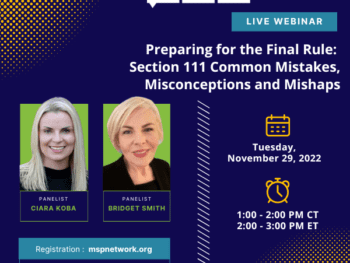
The stakes are significant in high exposure claims. This is often the case in high-dollar cases where settlement requires a certain peace of mind by having an allocation reviewed and approved by CMS. Issues of primary liability can factor into such claims when it comes to receiving a $0 allocation. In many instances, it is essential to work with a dedicated service provider who knows and understands the components and documentation required to obtain a “Legal Zero MSA” approval.
Case Study (provided by Tower MSA Partners): Obtaining a Legal Zero MSA
This case study considers the challenge and solution to obtaining CMS approval of a Legal Zero MSA on a completely denied case.
Click Link to Access Free PDF Download
“8 ‘Think Outside the Box’ Tactics to Settle Workers’ Comp Claims”
Challenge:
The employee, who is a Medicare beneficiary, allegedly suffered a left medial ankle and foot injury during his employment. At the time of the claimed injury, the claimant was an insulin-dependent diabetic.
- The treating physician opined the injury as a contusion to the left ankle and toe with no evidence of fracture, and the workers’ compensation claim was denied.
- During the course of post-injury medical care and treatment, the claimant’s uncontrolled diabetes resulted in a below knee amputation.
- Following the amputation procedure, the claimant sought care from a new physician who concluded ‘in his professional opinion, there was a direct correlation between the traumatic injury he suffered and the below knee amputation’.
- The workers’ compensation claim denial was affirmed, and $0 MSA was requested.
- The total potential MSA exposure was $169,053 if the Legal Zero MSA was not approved.
Solution:
Obtaining review and approval of a $0 allocation provides certainty for all parties involved in the WCMSA review and approval process.
The solution in this case study required the MSA legal team to work with the defense attorney and client to prepare the Legal Zero MSA by providing evidence as follows:
- The claim was denied in its entirety and in good faith.
- No payments for medical or indemnity were made.
- Medical records provided by Plaintiff’s counsel indicate treatment for a severe diabetic condition dating prior to the 06/25/2014 alleged injury.
- Formal denial filed to the North Carolina Industrial Commission stating that the claim is denied as the medical records received thus far do not substantiate relationship of any injury on 06/25/2014 to his complaints.
Results:
In its review of the evidence provided by the legal team, CMS concurred with the evidence as proof of no liability and the Legal Zero MSA was approved in full by CMS.
Savings achieved in this case totaled $169,053
Conclusions:
The stakes are high when it comes to obtaining a $0 allocation during the voluntary WCMSA review and approval process. Failing to work with an experienced MSP service provider who understands the process can result in delays, missed settlement opportunities and cases not settling, which will only add costs to your workers’ compensation program.

Author Michael Stack, Principal, Amaxx LLC. He is an expert in workers compensation cost containment systems and helps employers reduce their work comp costs by 20% to 50%. He works as a consultant to large and mid-market clients, is co-author of Your Ultimate Guide To Mastering Workers Comp Costs, a comprehensive step-by-step manual of cost containment strategies based on hands-on field experience, and is founder & lead trainer of Amaxx Workers’ Comp Training Center. .
Contact: mstack@reduceyourworkerscomp.com.
Workers’ Comp Roundup Blog: https://blog.reduceyourworkerscomp.com/
©2017 Amaxx LLC. All rights reserved under International Copyright Law.
Do not use this information without independent verification. All state laws vary. You should consult with your insurance broker, attorney, or qualified professional.
























